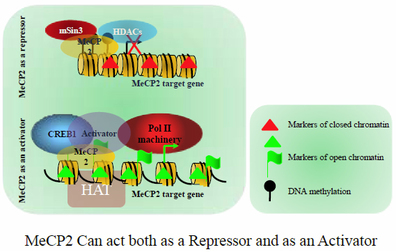Project 1. Epigenetics in childhood neurodevelopmental disorders; the underlying molecular mechanisms of disease

Epigenetic control includes gene regulatory processes that are not directly reflected by the involved genetic sequences. Such regulatory mechanisms include chemical modifications on DNA molecules (i.e., DNA methylation), histone post-translational modifications, 3-dimensional chromatin structure, enhancer-promoter interactions, and action of regulatory RNA molecules, among others. In the brain, an important epigenetic factor named “MeCP2” is the main protein that binds to methylated DNA and regulates gene expression. Proper MeCP2 regulation and function is essential for normal brain development. Accordingly, deregulated MeCP2 expression or its genetic mutations lead to childhood neurodevelopmental disorders that include Rett Syndrome (RTT) in females and MECP2 Duplication Syndrome (MDS) in males. While RTT and MDS are rare disorders, there also are common neurological conditions that are linked to altered MeCP2 expression, including as autism spectrum disorders (ASD) and fetal alcohol spectrum disorders (FASD). Our team uses a combination of cellular and molecular biology techniques, primary culture of embryonic and adult brain cells, transgenic mice, human and murine cell lines, and post-mortem brain tissues, to study mechanisms of disease for MeCP2-associated disorders that currently have no available cure.